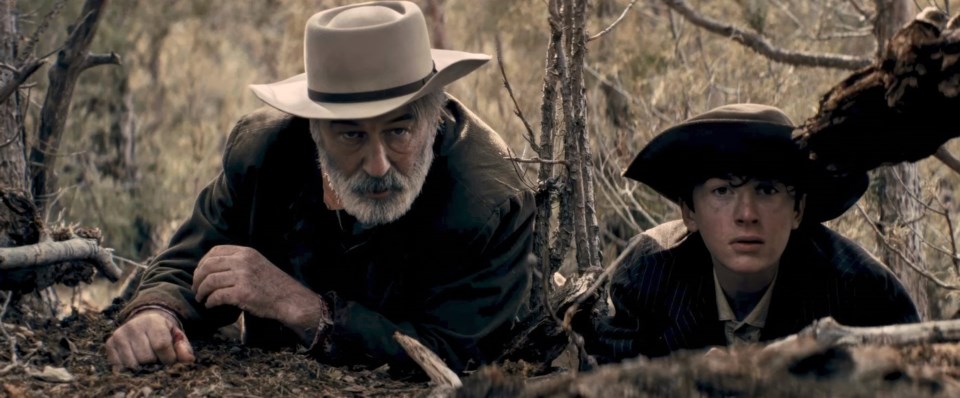Surely, bringing an audience to tears with a poignant ending is something every filmmaker dreams of.
And yet the moment that inspires a genuine, unambiguous tear in “Rust” is born of a true nightmare.
“...for Halyna,” the screen reads as the film comes to a close. Halyna Hutchins’ name also appears in Ukrainian. And we’re given a favored quote from the late cinematographer: “What can we do to make this better?”
Just as there’s no way to make this film’s offscreen history any better, there’s no way to write a normal review of a movie that is anything but. “Rust” has inevitably and inexorably become synonymous with tragedy: Hutchins’ shocking death during an on-set rehearsal, when producer-star Alec Baldwin pointed a pistol at her that somehow contained a live round. It discharged, killing her and wounding director Joel Souza.
An involuntary manslaughter charge against Baldwin was dismissed. The movie’s weapons supervisor is serving an 18-month prison sentence. And eventually, the film was finished, with Souza returning and cinematographer Bianca Cline replacing Hutchins.
Souza said at the film's premiere in Poland that the family wanted Hutchins’ work to be seen. The movie's terse publicity materials note that the original producers will not gain financially from it, and that although terms of a settlement were sealed, “it has been confirmed that (husband Matthew) Hutchins and son Andros will receive profits from the film.”
In any case, the movie is here. It is not, as many surely expect, a uniformly shoddy effort. The plot is basic and the dialogue merely serviceable, but there are lovely scenery shots throughout, the vastness, gentle light and deep colors of the American West illustrated carefully and evocatively by Hutchins’ — and Cline’s — camera work. Yes, the cinematography is what stands out here.
There are also several compelling performances, though Baldwin’s somewhat halting, somber turn is not among them.
Most of all, though, there's not a moment in “Rust” in which one loses awareness of the tragedy. While the scene we’ve all read about does not appear, there is constant gunfire, this being a Western. It’s hard to forget about a shooting while watching so much shooting.
In fact, we begin with an accidental shooting.
The unfortunate perpetrator is Lucas Hollister, a teenager in 1880s Wyoming who's recently been orphaned, along with his little brother. We learn later that their father shot himself a year after their mother died. So Lucas (Patrick Scott McDermott, in an accomplished performance) has become the parent.
On a trip into town, Lucas gets into a scuffle with another boy who's insulting their late mother, hurting him. The rancher father demands that Lucas come work for him to pay off his debt. And when he comes to the desolate farm where the boys live to get him, Lucas accidentally shoots and kills him, while aiming at a wolf.
A judge decides the crime was premeditated and sentences the boy to the gallows. His little brother comes each night to the prison to sleep next to him. Things look bleak — until a shadowy character with a white beard comes to break him out of the jailhouse, killing whoever gets in the way.
“You tell any SOB who comes after me that he will shake hands with the devil himself,” says the mystery man. It's Harlan Rust (Baldwin), a notorious outlaw who hasn’t been seen for years. He is also Lucas' estranged grandfather, having been alerted to the boy’s plight by his sister (Frances Fisher, excellent).
Thus begins the great chase. Rust and Lucas flee towards Mexico, the only place they can be safe. On their tail are a plethora of pursuers: Sheriff Wood Helm (Josh Hopkins) and various bounty hunters, chief among them the brutal Fenton “Preacher” Lang (Travis Fimmel, appropriately fearsome).
The two don't get along at first — they never do, in such stories — and Lucas aches to get back to his brother. But Rust convinces him it's better to stay alive. Eventually, luck runs out for the pair, and someone will have to pay.
But for its unique circumstances, one can imagine “Rust” coming and going without much of a ripple. The question now is, who is going to be seeing this movie? Certainly many people will come — or watch at home — out of morbid curiosity.
What they will find is a movie better in some aspects — especially, and poignantly, the cinematography — than they may have suspected. But it is one that will always be defined, and reflected in every frame, by its tragic history. And there's no real way to make that better.
“Rust,” a Falling Forward release, is unrated by the Motion Picture Association. Running time: 139 minutes. One and half stars out of four.
Jocelyn Noveck, The Associated Press



